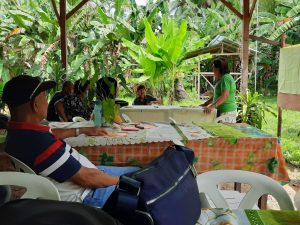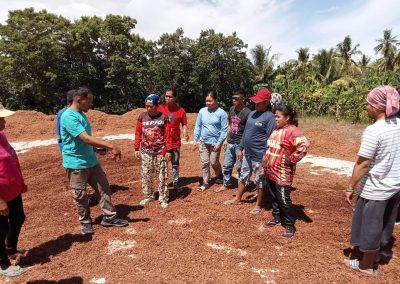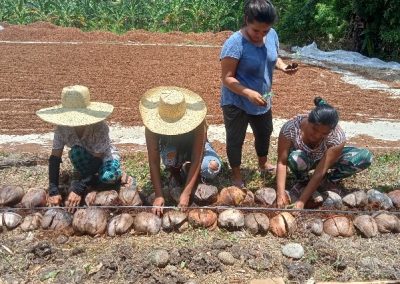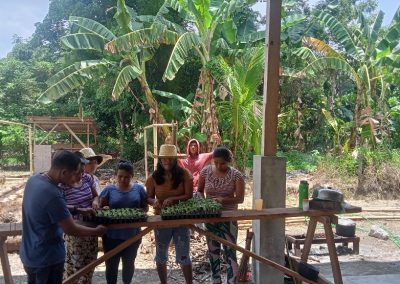The Philippine coconut industry produces around 14 million metric tons of coconuts annually and accounts for more than $1 billion export revenue annually, providing livelihood to around 3.5 million coconut smallholder farmers (CSHF). However, the tremendous value produced in the sector is not translated into better quality of life of CSHF who mostly are indebted and impoverished.
THE DANIDA MARKET DEVELOPMENT PARTNERSHIP (DMDP)
The DMDP project in the Philippines entitled “Promoting Inclusive Economic Growth through the Valorization of Coconut Husks” aims to address this problem by establishing and developing a coco peat and fiber supply chain to support the business of BIOGROW Philippines, thereby creating income and job opportunities for 3,000 farmers, 1,156 women and 300 young people. As a result, this project will contribute to SDG8 through: 1) diversified and secured livelihoods for 3,000 coconut farmers’ households; 2) the establishment of fibre-processing units providing local jobs; 3) the creation of chips/crush mills with local employment opportunities; and 4) the setting up of women centres creating opportunities for 1156 women on fibre valorisation. Additionally, this project will create jobs directly in Biogrow plant and through subcontracting.
In 2022, a total of 15 organizations have committed partnership with the IRDF BIOGROW and L3F consortium, either as coco husk processor or husk supplier. But only three organizations have sustained operations of their coco chipping business, set up through the support of BIOGROW while another one is still waiting for the installation of a power transformer that is required to operate the machine. From August 2021 – January 2023, the four partner associations processed a total of 6,317.79 cubic meter of wet chips equivalent to 1,074,024 husks, out of which 3,998 cubic meters were delivered to BIOGROW.
There have been a number of difficulties faced by partners coops and associations in the operations of their coco chipping machines, among which are the following: 1) technical issues related to power requirement of machines; 2) lack of workers; 3) lack of coop officer assigned or dedicated solely to the business; 4) inability of coop management to respond immediately to changes in procurement policies of partner company, and 5) 2 out of 3 coops do not have the land nor space to dry their chips. Three have no prior experience in processing or manufacturing, hence it took them several weeks to familiarize with machine operations and maintenance.
While there have been considerable constraints in implementation, the start-up was facilitated due to the timely formulation of the coop’s business plans, thanks to the early trainings conducted by the IRDF team. Moreover, the officers and staff of the coops were trained in the different aspects of the cocohusk business including in product quality and standardization.
The rest of the 15 coops/associations have engaged in other activities, e.g. TWWA delivered 262,860 husks to the Demo Center, UBCOWORFA delivered cocohusks to TAFWA. Others like TOCOFA, MIWFA, BIWFA and TAFWA youth have been delivering husks to the Demo Center. The Matanao Agricultural Workers Association has engaged in the business of supplying labor to the Demo Center.
The women centers likewise served an important role in sustaining the training of women in coco fibermaking and in coconet and rope making. Some women were trained in the production of coco peat-based organic fertilizer and others in processing of other food crops, e.g. bananas.
For the greening extension of the project, 587 farmers planted 195,000 hills of kakawate as perimeter fence in their farms. Three nurseries were established in the women centers of TIWA, KKMB and Demo center, where a total of 30,000 kakawate seedlings were already raised.
THE COCONUT TRAINING AND DEMO CENTER (COCO-TRACE)
The COCO TRACE was built in 2021 as part of the DMDP project. The objectives of the training center are to (i) accommodate in a single location all machinery (from Sri Lanka) that farmers and cooperatives need to be trained on the processing of coconut husks; and (ii) demonstrate the opportunities related to coconut husk business through trainings. The latter involve training directly on machine operation and maintenance as well as training on enterprise development such as responsible business conduct, documentation and monitoring of operations, financial analysis, logistics, safety, etc. The Training Center will be fully dedicated to farmers and as such operated by the project team during project implementation, and progressively transferred to the cooperatives/organization. It will sell its production to Biogrow, hence financing its maintenance costs in a sustainable manner. It is envisioned to operate autonomously as a social business after the project ends.
Presently, the DEMO Center is operated by IRDF technical officer following both the guidance of Biogrow on machinery operations and the expertise of IRDF in terms of farmer engagement and training. It has three chipping machines and two defibering machines. Chipping operations started last February 2022 and has already processed 704,520 husks equivalent to 3,914 cu m wet chips and 9,328 kg of dried chips as of January 30, 2023 delivered to BIOGROW plant. Eighty eight (88) farmers have supplied coconut husks to the Center for its chipping operation, with each farmer generating an average income from husks amounting to PhP2,174.00. The Training Center has employed a total of 43 workers, hereof, 29 female and 14 male. This include 11 husk gatherers.
The Training/Demo Center also established a communal vegetable garden managed by the training center workers. It also served as hands-on training for the women association members as they learnt the basics of composting, soil and water management and production of organic fertilizer using coco peat and cow manure.
During the project, a management team coming from trainees will be empowered in order to take over IRDF’s team after project ends. The team will be trained on both operations and social business management. The transition will be progressive and should start as soon as motivated and trust-worthy candidates are identified.
The BIOGROW Factory
The operations of the BIOGROW factory, the private sector partner in the consortium expanded in 2022 expanded despite the COVID lockdown restrictions in the beginning of the year.
The BIOGROW plant on its own processed 2.5 million husks bought from 450 farmers from 14 different collectors. Out of this plus the chips from partner coops and the Demo Center, BIOGROW was able to export around 16,300 cubic meters of compacted chips in 2022 or a total of 47.5 containers (345 cu.m. per container if compacted).
A total of 801 farmers supplied husks to the coops, demo center and the BIOGROW factory and thereby contributed to meeting BIOGROW’s quality standard for coco chips. Additional income derived by farmers from selling their husks range from PhP 1,700 to P3,600.00 per year, if farmers are able to harvest 3,000 nuts per quarter and sell their husks at PhP 0.25 – PhP 0.30/husk. Those with bigger land and harvest up to 12,000 husks per quarter can earn a maximum of PhP14,000/year.
COCOHUSK VALORIZATION AS A VIABLE BUSINESS FOR SMALLHOLDER FARMER COOPS
The Demo Center chips operations show that the coconut chips business is viable given certain conditions and the adoption of a more efficient process – from the purchase of husk to chipping, ageing and drying up to final delivery of coco chips to BIOGROW factory. These operational guidelines were shared with partner coops and associations to encourage them to improve their performance. The table below showed profitability of chipping business with each chipping machine generating a net income of PhP 1,911 daily or PhP 38,224 monthly or P458,688 annually.
Cost estimates for coconut husk chipping operation (one chipping machine), in Pesos
| Particulars | Daily | Weekly | Monthly | Yearly |
| Estimated Sales @ 400.00 x 20 cubic meter | 8,000 | 40,000 | 160,000 | 1,920,000 |
| Less Expenditures (Direct cost + indirect Cost + Fixed cost) | 6,089 | 30,444 | 121,776 | 1,461,312 |
| Detailed Expenses | ||||
| A. Direct cost | Daily | Weekly | Monthly | 1 Year |
| Husk Buying Capital @3500 x 0.35 | 1,225 | 6,125 | 24,500 | 269,500 |
| 4 Chipping Labor 3500 husk to 20 cu m (@ 80/cu m) Includes husk splitting, chipping, sacking) | 1,600 | 8,000 | 32,000 | 384,000 |
| Electricity (. 006/husk@14.50/kw | 261 | 1,305 | 5,220 | 62,640 |
| Ageing (8 pesos per cubic) | 160 | 800 | 16,000 | 192,000 |
| Water consumption for ageing (.34 centavos per cubic) | 6.8 | 34 | 680 | 8,160 |
| Sacking 1 peso per sack (20cum at 9 sacks per cum=180) | 180 | 900 | 18,000 | 216,000 |
| Drying rental per sack @2 pesos per sack | 360 | 1,800 | 36,000 | 432,000 |
| Drying labor including sacking 10 pesos per sack (7 kgs per sack 18 moisture content) | 1800 | 9,000 | 180,000 | 2,160,000 |
| Delivery fee 15 pesos per cubic | 300 | 300 | 300 | 300 |
| Total Direct Cost | 5,893 | 28,264 | 312,700 | 3,724,600 |
| B. Indirect Cost (1 year depreciation) | Daily Depreciation | Weekly Depreciation (5days/week) | Monthly Depreciation
(20days/mo) |
Yearly |
| Weighing Scale x 1 | – | – | – | – |
| Shovel (Pala) @ 600 | 2.5 | 12.5 | 50 | 600 |
| Sharpener (Bairan) @ 300 | 2.5 | 12.5 | 50 | 600 |
| Chipping Blades @ 700 x 4 | 11.7 | 58.5 | 230 | 2800 |
| Bukag @ 200 x 4 | 3.3 | 16.5 | 66 | 800 |
| Sack (with Tie Box, Aguha) @ 14 x 180 | 21 | 105 | 245 | 2,520 |
| PPE | ||||
| Safety goggles @ 150 x 4 | 2.5 | 12.5 | 50 | 600 |
| Ear Plug @ 90 x 4 | 1.5 | 7.5 | 30 | 360 |
| Cloth Gloves @ 30 x 4 | 1 | 5 | 20 | 120 |
| Total Indirect cost | 46 | 230 | 741 | 8400 |
| C. Fixed Cost | ||||
| Machine Rental (MONTHLY) | 150 | 750 | 3000 | 36,000 |
| Total Indirect cost and Fixed cost | 196 | 980 | 3741 | |
| Net revenue (sales less expenses and depreciation cost) | 1,911 | 9,556 | 38,224 | 458,688 |
DEVELOPMENT EFFECTS
Since 2021 when the cocohusk processing machines were installed and the BIOGROW factory established, a total of 113 jobs were already created from the combined operations of the coops and the Demo/Training Center. Of this, 60 are male and 53 are female. Meanwhile, BIOGROW has employed 55 permanent workers and 30 additional casual workers. An additional 32 jobs have been created at the private suppliers of Biogrow and about 46 jobs have been maintained among the husks collectors delivering to Biogrow while most fiber mills shut down and stop buying husks in 2022. This brings the total to 276 jobs created out of a target of 432 (64%) by end of 2023.
While there have been operational and technological problems encountered by the coops that limited the volume of the chips produced in the past months, the impact on job generation of the cocohusk business of the coops and BIOGROW is significant. Therefore, it is imperative that the partnership should work towards implementing the following key recommendations: 1) sufficient financing and working capital for at least two months; 2) logistical support; 3) acquire, borrow or rent land for stockpiling of chips; 4) continue training program to improve management of chipping operations; 5) and manage labor efficiently while adhering to Responsible Business Conduct.
In conclusion, the business model introduced by the consortium, where smallholder coconut farmers will deliver their husks to their cooperatives and associations, which in turn will process the husks into coco fiber, peat and chips to be supplied to the BIOGROW factory has remained viable. IRDF and BIOGROW need to support this partnership in innovative ways that could address the economic, social and technological constraints typically faced by small coops and associations. Improving institutional, management and technological capacity of the coops that represent mostly smallholder farmers would have the biggest impact on poverty reduction and employment generation in the rural areas.
DMDP PARTNER COOPS AND ASSOCIATIONS


The Fairtrade Farmers Credit Cooperative (FFCC) was organized on February 1, 2012. It envisioned instilling coconut farmers with good moral and high spiritual values and with improved living standards in safe farm communities. The cooperative would develop fair-trade organic farm products that assure customers confidence and satisfaction. It aims to promote and increase fair-trade organic farm outputs among members instilled with good moral and spiritual values as their mission. It encourages active participation among members to ensure continued capital build-up and profit sharing, generating funds and extending credit for this purpose. The FFCC promotes farm practices which conform to fair-trade organic standards and implements measures that enhance safety in farm communities through linkage with local officials. Currently it has 198 members. FFCC members supply their organic coconut products to AG Pacific Nutriceuticals Corp. which in turn processes them into centrifuged virgin coconut oil and exports to Europe, Australia, Japan and Korea.
In the first quarter of February 2022 FFCC joined the Coco 3 husk valorization project by operating a coco husk chipping machine. To date FFCC has processed 324,826 husks equivalent to 1,910.74 cubic meter coco chips from February 2022 to January 31, 2023. An additional 450 cu m of aged coco chips are being dried for delivery to Biogrow. The husks were supplied by 82 smallholder members which gave them additional income of PhP1,296/farmer/year. The organization is also involved in production of organic fertilizer using cocopeat. Youth members of the family help their parents in such farm work as weeding, mulching, collecting harvested coconut, loading and drying.
The Sumbac Multipurpose Cooperative (SMPC) is a multipurpose cooperative registered with the Cooperative Development Authority (Registration Number: 9520-12004602). It is based in the province of North Cotabato, Region 12. In the last quarter of 2018 SMPC formally entered into a partnership with the IRDF for Restoring Livelihood with coconut farming. At present they supply whole nuts to Franklin Baker and produce coco chips from processing coconut husks. IRDF conducted series of trainings and seminars like leadership training, organizational management, values formation, business enterprise planning on coco chipping and coco fiber twining. Towards the end of 2020 SMPC established a women’s community center provided by DANIDA facilitated by IRDF for women empowerment and as venue for any economic activities. The cooperative has a total membership of 272 farmers. Biogrow provided one rent-to-own chipping machine; SMPC started coco chipping in August 2021. To date it has processed 351,054 husks equivalent to 2,340 cu.m. wet and dried chips, benefitting 103 farmer suppliers that earned an average of PhP 1,704.00 annually. Through this project the cooperative has provided employment to women and youth in the area.
Taluntalunan Integrated Women Association (TIWA) was organized by IRDF in 2019. It is registered with DOLE and has 35 members. The association manages the women’s center provided by DMDP. To date they are engaged in coco twining for geonet production as well as for the production of flower pots, poles and rugs. Further they have banana chips production as additional income for their families.
This association has a viable supply of husks for valorization but unfortunately they cannot afford the electric transformer needed to operate the chipping machines. TIWA also lacks the logistics to secure a regular supply of husks to sustain chipping operations.
Tacul Agri-based Farmers and Workers Association (TAFWA) – was organized by IRDF through its coconut resiliency project on September 26, 2019. TAFWA is registered with the DOLE and has 376 members. It is engaged in whole nut delivery to Franklin Baker and chips production for Biogrow. To date the association has processed 233,803 husks equivalent to 1,559 cu m of coco chips. There are 61 farmer-members who supply coconut husks for the chipping operations. Each farmer supplier has generated an average additional income from husk supply amounting to PhP 1,779.00/farmer. The cooperative also saw an increase in its workforce including women and youth.








